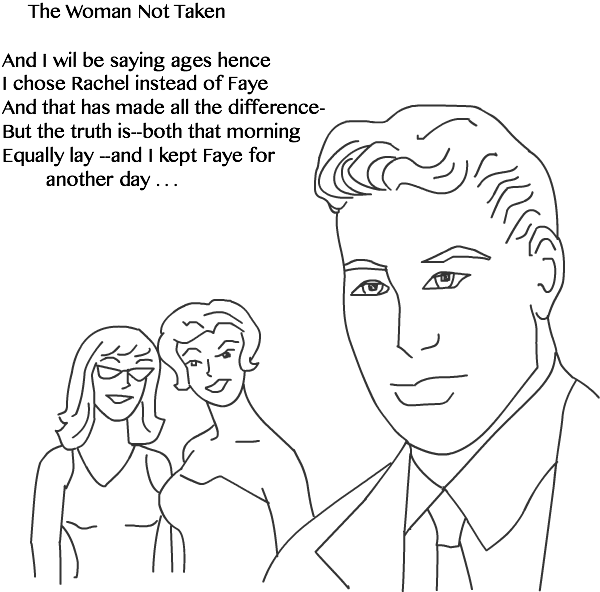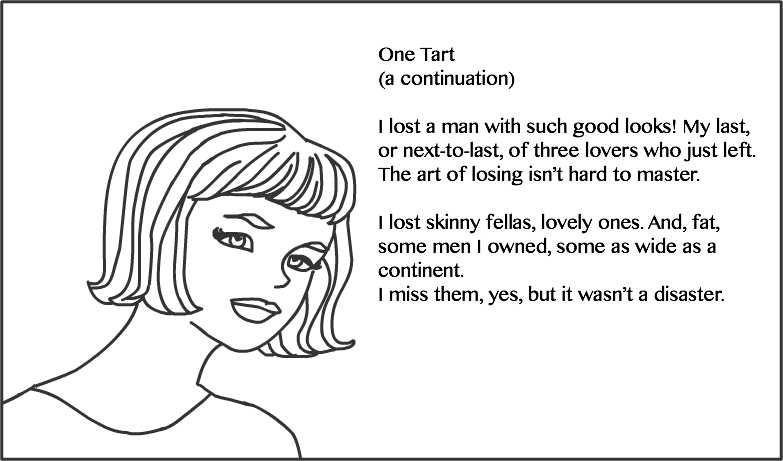Now that I'm thinking of food and poetry, it's hard not to mention Ben Jonson (I always spell it Johnson) and his wonderful "Inviting a Friend to Supper." For a long time I wanted to know what Canary wine was. Tom Clark informed me that it's wine from the Canary Islands. Shakespeare talks about Canary wine as well.
It's funny how certain lines of a poem stick in the mind--like "ancient glittering eyes" from "Lapis Lazuli." Or rather, "Their ancient, glittering eyes are gay."
I was reading "Kubla Khan" and actually began to wonder if there were cows in heaven. Or if the milk would be dairy-free. I love being overly-literal.
Art for Art’s Sake
I’ve always liked the term that is a translation of the French, l’art pour l’art, meaning art should be for no other reason than its beautiful, beautiful self. I picture it as a goddess, as Rilke’s angel, as Dante’s Beatrice, as something so intoxicating, it should be illegal. And maybe it is.
I often think art as that place where logic goes around the bend, where the mind doesn’t stay tucked in like a shirt in tight trousers. Where a dream is as important as daily errands. Where the mind wanders and wonders about the humdrum and the absurd in equal proportions.
Maybe that's because I do have a habit of going around the bend.
I’ve always wondered about halos, for example, ever since the day I was told by a Sunday school teacher that I could grow a halo. But only if I behaved like an angel. (I didn’t worry about the “if only” part of the sentence.) Would it be hot? I asked. She said yes. Would I glow like a streetlamp? Would it be dangerous to walk around with a hot glowing head? She didn’t say. I thought about that for years, imagining myself lit up like a lamp all night on the downtown mall in Charlottesville, Virginia. Bugs would flit around me. Random drunks or addicts would stop by to chat, too drunk or drugged to be surprised to see a lady lit up like that.
It was that memory that inspired my poem, “The Woman with the Halo,” that is included in WHY GOD IS A WOMAN. As I was writing the poem, I began to wonder what if the poor woman could never turn off the light? Or dim the halo? What if she tried to lie down and sleep, and her sheets caught fire?
I also wondered, as I often do, what is the value of this kind of thought? Or poem?
Is it enough to say, l’art pour l’art . . . Or should art have a function? Like say, a cup holder?
As a mother, I often heard parents discourage their children from pursuing any kind of art because it has no use. And becasue the arts rarely create any income, which is why I often translate l’art pour l’art as art, poor art.
Years ago I taught with Robert Bly at a prose poem workshop in New Hampshire. One night we were out a restaurant, and he became suddenly angry about how poets let everyone take advantage of them. About how little the world rewards poets for their hard work. He was staying with a painter at the time, a man who sold his paintings for thousands of dollars. When will I ever sell a poem for anything more than a few bucks here, a few bucks there and nothing everywhere else? he asked. Do you know that I give my books away to anyone on the street? I mail them to perfect strangers, too? (It’s true. He not only gave his books away, but he mailed them to everyone and anyone.) I was really surprised because Robert Bly was so famous. He’d written best sellers. I assume his poetry sold well.
An idealist, I argued that money isn’t why we write poems. He looked at me blankly and said, So you don’t think much of yourself? You don’t think you have as much value as a carpenter? A garbage man? A secretary?
I thought of Bly when I was reading an interview with Eileen Myles in the Paris Review https://mail.google.com/mail/#search/paris+review/150249738cb53a5c and I ran across this quote:
“When I took the job at UC somebody came up to me at a reading and said, How does it feel to have sold out? I’m like, What did I sign up for? A life of poverty?”
I also thought of Bly when I met Sienna Oristaglio at the last AWP. Sienna and her co-workers, Noah Bloomenson-Cook, and Karina Vahitova have started the Void Academy http://thevoidacademy.com, which is committed to the idea that art has value. They design websites and teach artists how to connect to the world rather than push it away as I am inclined to do.
After all, how can I write if I am inviting the world into my life? And how can I worry about sales? Honestly, I don't want to get too depressed!
Thanks to that meeting (yes, SOMETHING good came out of AWP), I have this new website. I am getting used to it—having a place where people can easily find me on the web. A place to display my comics. I am still not sure about personal value. I do love their ideas, and I wonder if maybe Bly was onto something. He insisted change begins in our minds.
I thought of this comic when I was reading The Paris Review article by David Orr on "The Road Not Taken," that suggests this often quoted poem is one of the most misread poems in the country.
I was playing with the first line of this poem by Gwendolyn Brooks: THE POOL PLAYERS. SEVEN AT THE GOLDEN SHOVEL. We real cool. We Left school. We Lurk late. We Strike straight. We Sing sin. We Thin gin. We Jazz June. We Die soon.
Watching the debates last night, I thought of Emma Lazarus's famous poem, "The New Colossus." When was our country last that welcoming?
I keep thinking of new poems I could add to WHY GOD IS A WOMAN--about all the ways the world would be different if gender roles were reversed. One of my friends emailed and suggested I should draw a Boberto doll--the male version of a Barbie doll that I wrote about in the book, but I don't think the drawing would pass the Facebook censors.
I love Elizabeth Bishop's poem, "One Art." It's hard not to keep going in this vein with something like:
Then practice losing farther, losing faster:
places, and names, and where it was you meant
to be. None of these will bring disaster
I lost a man with such good looks! My last, or
next-to-last, of three lovers who just left.
The art of losing isn’t hard to master.
I lost two skinny fellas, lovely ones. And, fat,
some men I owned, some as wide as a continent.
I miss them, yes, but it wasn’t a disaster.
The last stanza, so lovely, so true and painful--I would never want to mess with: "Even losing you (the joking voice, a gesture/I love) I shan't have lied. It's evident/ the art of losing's not too hard to master/though it may look like (write it!) like disaster."
If only we poets didn't have to write a narrative essay for the Ohio Arts Council grants! I really pause when I try to answer these questions about my work.
I have read that Smart's Jeoffry is the most famous cat in literature, more famous than the Cheshire cat perhaps. When I think of cats, I think how they consider me, as much as vice versa. As if perhaps I don't live up to their standards. In drawing the comic, I was thinking of how people become so much like their cats and dogs after a time.
In his book, State of the Art, David Lehman writes that "Dover Beach" is the most parodied poem of all time. My favorite poem to parody is "Annabel Lee," perhaps because it was the first poem I fell in love with. When I was a girl, my father used to say that Edgar Allan Poe had once wandered in the woods behind our house. He called them the Usher Woods. Of course, I believed him.
In The State of the Art, David Lehman writes: "Whitman recalls the moment when, as a boy alone on the shore of Long Island, he heard two mockingbirds sing, and then one stopped singing and the other missed his mate and sang elegiac songs to her, and suddenly Whitman understood his purpose in life, "what I am for."





















